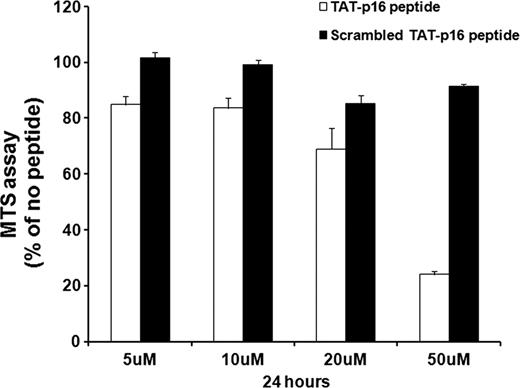Abstract
Abstract 3921
Autologous stem cell transplantation (ASCT) is an effective treatment strategy for Mantle Cell Lymphoma (MCL) that has been shown to improve disease free survival. However, data from recent trials suggest that the presence of minimal residual disease (MRD) contributes to relapse following current intensive treatment strategies, including ASCT. Thus, we sought to test a highly selective approach to eradication of MRD in stem cell collections from MCL patients using targeted small peptides that disrupt the aberrant cyclin/CDKs interactions that are involved in the pathogenesis of MCL. In the current study, the efficacy of a mimetic peptide to the CDK inhibitor p16INK4a to eliminate MRD was tested. Using (3-(4,5-dimethylthiazol-2-yl)-5-(3-carboxymethoxyphenyl)-2-(4-sulfophenyl)-2H-tetrazolium) (MTS) cell viability assays, we demonstrated that a transducible TAT-p16 mimetic peptide was able to induce cell death in the MCL cell line, Jeko-1, in a dose and time-dependent fashion (see Figure). A TAT-p16 mimetic was able to induce cell death in approximately 60% of Jeko-1 cells after 4 hours of incubation, and approximately 80% of Jeko-1 cells at 24 hours. In contrast, the same dose of TAT-p16 mimetic had no effect on cell survival when it was incubated with CD34+ rich apheresis samples from healthy donors. Furthermore, CFU-GM, BFU-E colony assays showed that there was no toxicity of the TAT-p16 mimetic when compared to untreated cells or cells treated with a control, scrambled TAT-p16 peptide. TAT-p16 mimetic did not impair erythroblast differentiation but induced mild apoptotic cell death in the erythroblast cells. The strategy was further tested using a CD34+ enriched apheresis sample collected from a patient with MCL with documented MRD who had been treated on a clinical trial of ASCT for MCL. Using Real-time quantitative PCR for IgH and BCL1 gene rearrangements, we demonstrated that the TAT-p16 mimetic was able to reduce MRD level by 40% compared with the scrambled TAT-p16 peptide. These data suggest that the use of a peptide-mimetic to p16 selectively and effectively can reduce MRD in MCL cells and in an apheresis (stem cell) sample from a patient with MCL. Treatment with the peptide allowed differentiation of CD34+ progenitor cells. A combinational approach using additional targeted cell cycle regulatory peptides that block p21CIP1/WAF1 and cyclin D2 is being explored to optimize the efficacy of this purging technique. Thus, this novel strategy may be an effective, selective and non-toxic method for eradication of MRD in MCL.
No relevant conflicts of interest to declare.
Author notes
Asterisk with author names denotes non-ASH members.


